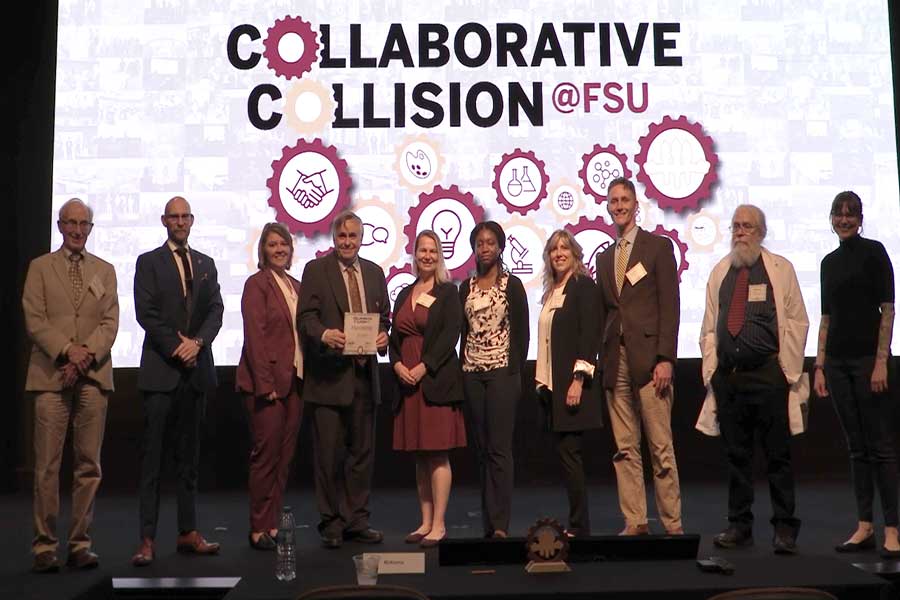
Florida State University is investing in four projects looking to address issues facing the state of Florida.
The FSU Office of Research granted more than $172,000 to projects addressing STEM education, coastal resilience, health literacy and clean energy and transportation. The winning team, FSU CHOOSE, received more than $97,000, while the three other finalists received $25,000 each.
“Florida is a really interesting place to say the least,” said Mike Mitchell, assistant director of research strategy and impact at FSU. “We’re the third-most populous and fastest-growing state, represent the world’s 16th-largest economy by GDP, and have unique geographic, demographic, and economic features. This means we face a wide variety of potential challenges, and I’m really proud of our finalists this evening who have spent the last few months exploring how they might leverage the research strengths of one of Florida’s preeminent universities to develop solutions to four of these challenges.”
The Collaborative Collision program, launched in 2016, brings FSU researchers and community partners together around a common topic and helps them form research groups based on their interests. The teams participate in a 10-week development program with the Office of Research Development, or ORD, and then pitch their ideas to a panel with the hopes of taking home seed funding to jumpstart their project.
“Bringing together people from different disciplines, with different skillsets and perspectives, is essential if we want to create innovative solutions to the complex problems Floridians are facing,” said Evangeline Coker, a research development coordinator. “Interdisciplinary work isn’t easy. Interdisciplinary work requires a commitment to communication, to understanding the problem and your teammates, and to being open to new ideas from outside your comfort zone. That’s what these teams did. The results are exciting projects that will really benefit our local communities in amazing ways.”
Here are the four teams and their proposals:
WINNER
FSU CHOOSE: Collaborative Hub for Outreach and Opportunities in STEM Education
This team is focused on expanding the number of people pursuing science, technology, engineering and mathematics (STEM) careers through outreach efforts addressing challenges in middle and high school STEM programs. By creating a STEM outreach hub to encourage coordination, collaboration, and partnerships within FSU and with North Florida community partners, the research team will launch a long-term effort to increase participation in STEM fields and establish Florida State University as a national leader in STEM outreach.
RUNNER-UP
Coastal Adaptation for Rural Environments
This team is working to make FSU a hub for sea-level rise (SLR) adaptation support for rural communities in Florida. One of the ignored aspects of SLR adaptation is that some environments, places and resources will not be able to be saved from future SLR impacts. In the one-year project, our team will build and pilot a process for analyzing, identifying and prioritizing areas and assets that might be lost to SLR, proposing strategies for saving assets that can be saved, and developing processes and projects for memorialization of areas that cannot be saved. After testing the process in Franklin County, the team will extend the approach to other rural coastal communities in Florida.
RUNNER-UP
Health Literacy and Education
Health literacy, a social determinant of health, is highly associated with other determinants (e.g., socioeconomic status, education, community). Low Health Literacy (LHL) increases the risk for negative health outcomes. Research indicates that individuals with LHL are twice as likely to have preventable emergency department visits, while underutilizing outpatient services when medically necessary. This overburdens health care systems and may lead to delays in care. To address LHL, researchers will develop a game-based intervention that provides individuals with actionable instructions on when, where, and how to access credible health information. The research team will focus on disadvantaged Floridians in the Big Bend area because of the overwhelming evidence of higher risk for LHL and related health complications. Given Florida’s significantly higher infant and maternal mortality rates, the pilot program will focus on the relationship between LHL and pregnancy to improve outcomes.
RUNNER-UP
Clean Resilient Reliable Efficient Action for Transportation and Energy
This proposal arises from an FSU team that is working to decarbonize transportation and claim exclusive research and technology positions for FSU in billion-dollar hydrogen hubs and other large opportunities. The team will undertake activities to comprehensively assess the opportunity landscape, assess FSU’s situation and preparedness, assess stakeholders and potential partnerships, identify potential test beds and adoption challenges, develop a roadmap for clean hydrogen research success and submit proposals for major external funding.




